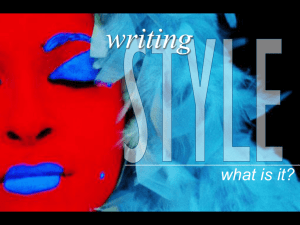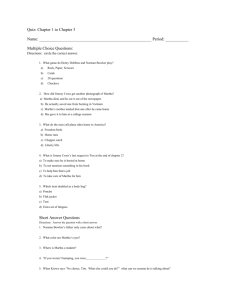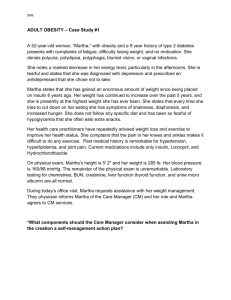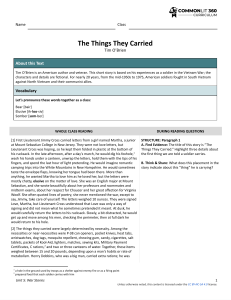Precis Form & Content
advertisement
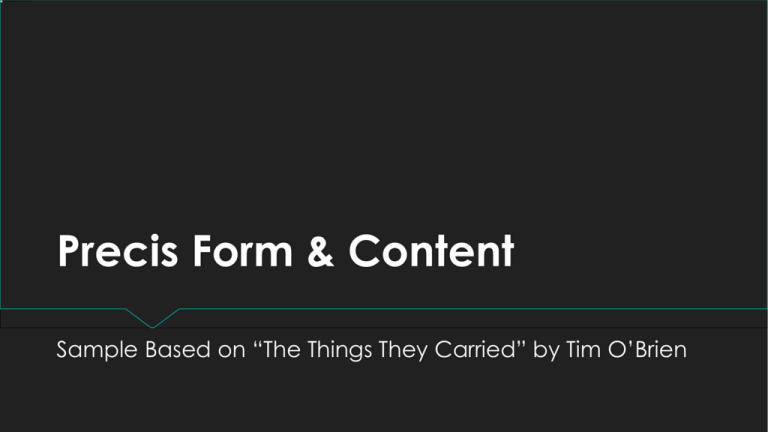
Precis Form & Content Sample Based on “The Things They Carried” by Tim O’Brien Selected Focus for Analysis Analyze the symbolic role of one of the objects a soldier carries in the story. Describe what the object represents to that character and why he chooses to carry it. Support your analysis with passages the text. Basic Format & Content A précis is a short, succinct (precise) piece that serves two functions: the first is to summarize a piece of literature; the second is to briefly analyze one element of fiction or stylistic device for its effect. The summary is to familiarize the reader/grader with the piece that will be analyzed. The analysis is to demonstrate a deeper understanding of the piece; it is to take one idea and develop how this concept creates meaning throughout the whole work of literature. For the purposes of ENGL1302, it is necessary to have a roughly one-page précis consisting of two paragraphs. Be sure to check for spelling, grammar, punctuation, and syntax within your work. Just because this is short does not make it insignificant. You may use first person pronouns in the work. Please be sure to type this following ALL guidelines of MLA format. Content of Introductory Paragraph Some Relevant Title The first paragraph is the summary of the work of literature. This needs to contain the “Title,” author, genre, and the plot or poetry summary. This paragraph will very in total length; however, it is necessary to hit all of the important points of the plot [beginning, middle, end] without paraphrasing the entire work. Be sure to end with a viable thesis statement about what will be analyzed. Sample Title & Introductory Paragraph Love That is Not Love “The Things They Carried” is both the first chapter of Tim O’Brien’s novel as well as a short story that shares a title with the fictionalized historical novel. The novel is set during the Vietnam War, but the opening chapter revolves around the death of Ted Lavender in April of an undisclosed year. Amidst the various internal and external conflicts, the platoon leader, Lieutenant Jimmy Cross, must face, Cross is fixated on his hope of love from Martha, a junior at a New Jersey college. Of all the tangible things that these young men carry: weapons, personal gear, general equipment, it is the intangible—abstract, emotional—that weighs most heavily on Cross’s mind. One such symbol of this possible love is the collective letters from Martha to Cross. Content of Body Paragraph The second paragraph is a quick analysis of one element of literature or style as demonstrated within the chosen piece of writing. Elements of literature and style include—but are not limited to—character(ization), conflict, foreshadowing, flashback, symbol, motif, theme, repetition, allegory, etc. In choosing one of these, it is necessary to state what is being analyzed and how/why/what about the device creates meaning within the work. For poetry, it is important to connect the literary device to the development of Tone or Theme. Provide at least two quotes (no more than three) to illustrate the element in action; then be sure to clarify the purpose and effect on the story / poem and reader. In other words, if a symbol is being used in the story or poem, state what the symbol is, and provide quotations demonstrating the symbol in action, then explain how, why, or what about this is significant to the understanding of the work for the reader. Be thorough and specific in your quotation choices and analysis. Be sure to provide in-text parenthetical citations for pagination and line reference. Sample Topic, Lead-in [embedding], 1st Quotation & Citation The letters Martha sends to Jimmy Cross symbolize the hope and uncertainty he has for life beyond the reality of war. Cross is encouraged by the letters because they allow him to mentally escape the war. Part of his routine occurs at the end of each day’s march when Cross will take out her letters to re-read them and use “the last hour of light pretending. He would imagine romantic camping trips into the White Mountains in New Hampshire. He would somtimes taste the envelope flaps, knowing her tongue had been there” (101) giving him the imagined effect of touching his tongue to hers in a distant act of intimacy. [What Analysis Will Explain HOW / WHY / WHAT ABOUT The Quotation Develops, Defines, Defends The Topic AND Thesis?] The conflict presented by her letters is the likelihood that Martha does not view the relationship in the same way as Cross. As he contemplates the content of the letters, he thinks, “They were not love letters, but Lieutenant Cross was hoping, so he kept them folded in plastic at the bottom of his rucksack. . . .More than anything, he wanted Matha to love him as he loved her, but the letters were mostly chatty, elusive on the matter of love. . . .They were signed Love, Martha, but Lieutenant Cross understood that Love was only a way of signing and did not mean what he sometimes pretended it meant” (101). [ANALYSIS?] Analysis Practice Part of his routine occurs at the end of each day’s march when Cross will take out her letters to re-read them and use “the last hour of light pretending. He would imagine romantic camping trips into the White Mountains in New Hampshire. He would somtimes taste the envelope flaps, knowing her tongue had been there” (101) giving him the imagined effect of connecting with her. Use of the words “pretending,” “imagine,” “knowing” [illustrate the difference between fact and fiction—her distance and his desires Details: time of day when he can indulge his fantasies of where he would like to go with her and touching his tongue to where hers had been in a distant act of intimacy. “They were not love letters, but Lieutenant Cross was hoping, so he kept them folded in plastic at the bottom of his rucksack. . . .More than anything, he wanted Matha to love him as he loved her, but the letters were mostly chatty, elusive on the matter of love. . . .They were signed Love, Martha, but Lieutenant Cross understood that Love was only a way of signing and did not mean what he sometimes pretended it meant” (101).

